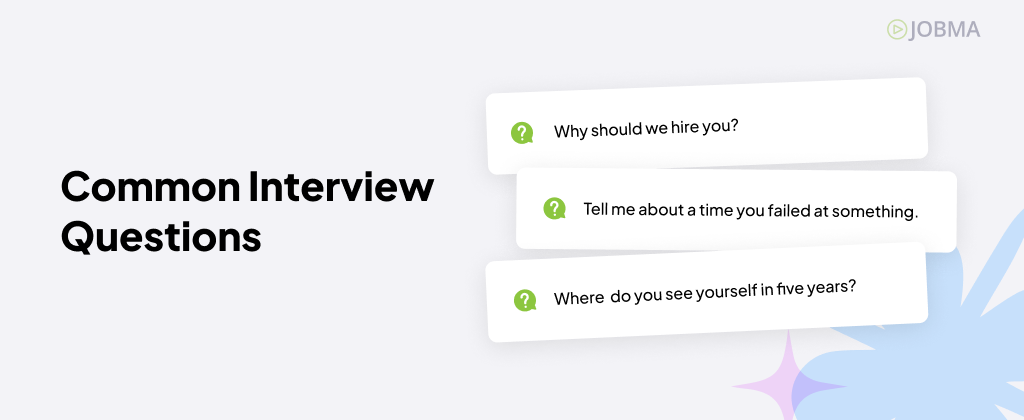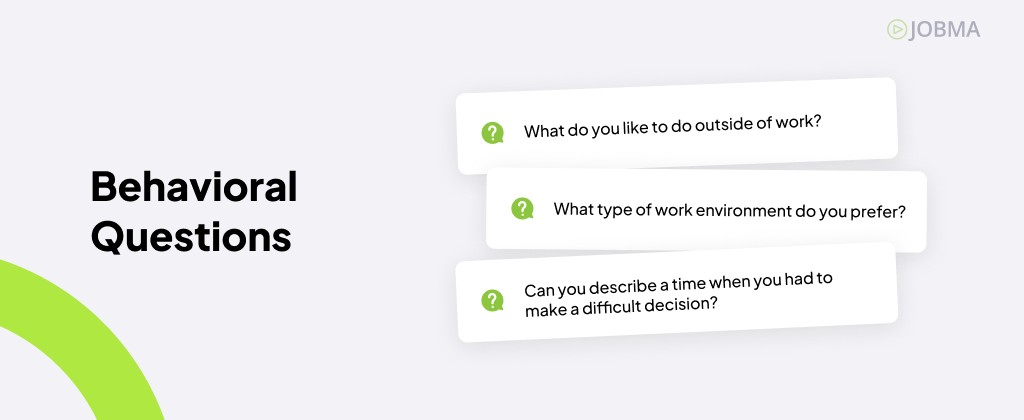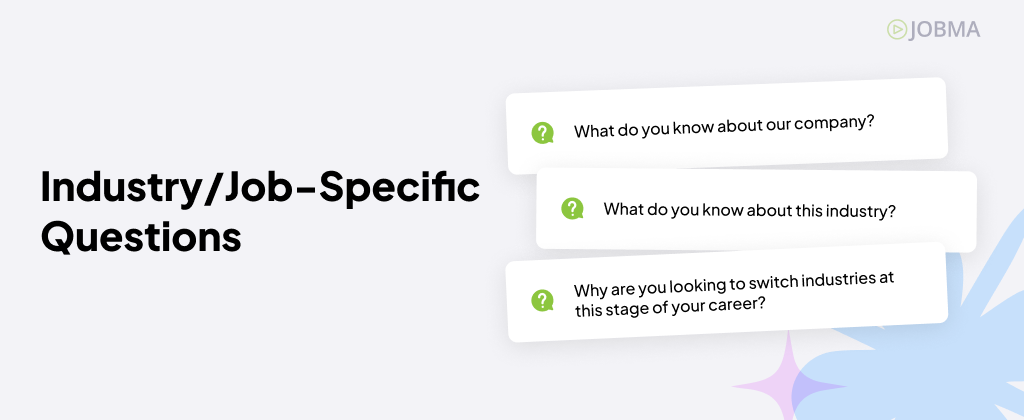Most Commonly Asked Questions in Interviews and How to Answer Them
The job market can feel overwhelming, especially when you’re starting a new career. While job interviews don’t follow a script, there are a few questions that pop up time and time again, whether you’re preparing for a technical role or something more non-technical. And if you’re aiming for a career in IT, it’s also worth knowing the kind of questions asked in technical roles, since they often focus on problem-solving and technical expertise.
Whether your interview is virtual or across the table, chances are you’ll get hit with something like:
- Why should we hire you?
- Tell me about a time you failed at something.
- Where do you see yourself in five years?
You’ve probably done your prep, you’ve looked up the company, stalked the hiring manager on LinkedIn, and practiced a few answers in front of the mirror. But then, during the interview, the interviewer asks a question, and your brain goes static. You’ve prepared for this moment, but now? Nothing.

That’s why we’ve put together a guide for the most commonly asked interview questions, why they’re asked, and how to respond in a way that feels confident, clear, and true to you. If you are job hunting, knowing what to expect and how to respond can give you an advantage.
Keep in mind- the example responses we’ve shared are just one way to respond. Think of them as starting points, a way to frame your answer and guide your thinking. You will need to frame your responses based on your experience, backed by real examples, and tailor them to the role you’re applying for.
1. Tell me about yourself
Why they ask: To see how well you know yourself, and how you choose to tell your story.
Here’s how to approach: Think of this as your opportunity to pitch. Keep it relevant, share your path, what drives you, what led you here, and what connects you to the role?
Example (Full-Stack Developer role): I’m a certified full-stack developer with a strong foundation in both front-end and back-end technologies. I first got into coding through free online resources, and that curiosity led me to pursue formal training and real-world projects. Most recently, I built a user-friendly e-commerce site and optimized its backend to reduce load times by 40%. What draws me to this role is your team’s focus on product innovation – it feels like a space where I can grow, contribute meaningfully, and continue building things that make a real impact.
2. Walk me through your resume.
Why they ask: To see how your experiences connect and if there’s a logical progression.
Here’s how to approach: Talk through key moves, what you learned, and why they made sense at that time.
Example: Sure, I started my career as a front-end developer after completing my certification. Over time, I realized that I wanted to understand the full product cycle, so I began learning backend technologies. In my last job, I led a full-stack revamp project that improved system efficiency by 30%. That’s when I knew I wanted to move into roles with broader ownership.
3. Why do you want this job?
Why they ask: To check how genuine your interest is.
Here’s how to approach: Show that you’ve done you’re homework and that this role excites you.
Example: I’ve been following your company’s work [mention specific initiatives] and it closely aligns with my passion for [building impactful solutions]. This role feels like a natural next step for me, your focus on [value/culture] speaks to me, and I’m excited by the chance to contribute while continuing to grow professionally.
4. Why should we hire you?
Why they ask: To hear what you believe you bring to the table.
Here’s how to approach: Combine your strengths, past results, and how you’ll plug them into the role you’re applying for.
Example: I bring a mix of creativity, accountability, and technical depth. In my last role, I helped cut page load time by 40%, which boosted conversions significantly. But beyond the numbers, I’m someone who thrives in team environments and brings ideas to the table. I’ve studied your product and genuinely believe I can make an impact from day one.
5. What are your strengths and weaknesses?
Why they ask: To see if you’re self-aware and honest.
How to approach: Share real examples, but focus on what you learned from that experience. In fact, tools like shadcn AI can help you reflect on your experiences and identify areas for growth more clearly.
Example: For strength, begin with something like I’m great at breaking down complex problems into manageable steps. At my last job, this helped us detect an early UX issue and redesign the flow before launch.
For weakness, you can frame something like, I used to hesitate when asking for help, thinking I had to figure everything out myself. I’ve learned that collaboration makes the outcome better and strengthens the team. Frame your weakness and turn it into a strength.
6. How do you handle pressure or stressful situations?
Why they ask: Stress is a part of the job, and they want to know how you manage it.
How to approach: Share a story where you kept things moving under pressure.
Example: I’ve come to see pressure as a part of growth. During a recent product rollout, we hit a snag a few days before launch. Instead of reacting emotionally, I focused the team on a short-term solution and proposed a longer fix. It reminded me that staying calm helps everyone move forward more effectively.
7. How do you handle feedback?
Why they ask: To find out if you’re defensive or open to growth.
How to approach: Personal growth arc. Be real about how you used to handle feedback and share how you’ve evolved.
Example: I see feedback as fuel. Early in my career, I used to take feedback personally. But I’ve since learned to ask clarifying questions and focus on the “why” behind it. Feedback has helped me refine my communication and improve the impact of my work.
8. What are your salary expectations?
Why they ask: To make sure you’re aligned with their budget
How to approach: Be prepared with a range, but show your flexibility
Example: Based on my experience, the scope of this role, and the industry range, I’d expect a salary between X and Y. I’m open to discussion, especially if there’s room for growth, learning, or performance-based incentives.

9. Where do you see yourself in 5 years?
Why they ask: To see if your long-term goals match what the company can offer.
How to approach: Show ambition and keep it rooted in reality.
Example: In five years, I see myself leading initiatives that blend strategy and execution. I’d love to be in a role where I can mentor younger team members and continue building solutions that solve real-world problems. Ideally, that’s happening here, because I see long-term alignment.
10. Are you interviewing elsewhere?
Why they ask: To get a sense of your urgency and how serious you are.
How to approach: Be honest, especially if you have other offers, but stay focused on this opportunity.
Example: Yes, I’m exploring a few opportunities, but this one genuinely interests me. Your approach to [innovation, culture, mission] feels aligned with what I’m looking for next. I’m excited about the potential here.
11. What do you bring to the table?
Why they ask: To hear what sets you apart and if you understand your values.
How to approach: Combine your hard skills and soft skills in a way that’ll make you memorable.
Example: I bring a balance of technical skills and people skills. I’ve worked in cross-functional teams where I wasn’t just executing tasks, I was helping connect the dots between product, design, and development. I’m also someone who shows up consistently, takes ownership, and stays curious, which I’ve found makes a real difference in fast-paced environments.
12 Why did you leave your last job?
Why they ask: To check if you’re leaving for the right reasons.
How to approach: Stay professional even if the exit wasn’t perfect.
Example: I learned a lot in my last role and had the chance to work on some impactful projects. But over time, I felt like I’d hit a growth ceiling. I’m looking for a role that challenges me more strategically and allows me to contribute in new ways.
If it were a toxic environment, try to keep it neutral and avoid talking negatively about your previous employer. You could say something like: I realized that the work environment wasn’t the best fit for me in terms of collaboration and support. It helped me reflect on the type of culture I thrive in, and it’s something I’m prioritizing in my job search.
13. Tell me about a time you handled conflict well.
Why they ask: To see how you work with others when things get tense.
How to approach: Show that you stay calm and collected.
Example: At my previous job, a teammate and I had different approaches to work. Instead of letting it build up, I scheduled a quick one-on-one, focused on listening first, and then shared my perspective. We found a middle ground, combined our ideas, and ended up with a better outcome. This experience always reminds me of how valuable open communication can be, even in moments of disagreement.
14. How do you stay organized when working on multiple projects?
Why they ask: To see if you can manage time when under pressure.
How to approach: Show how you work, your system, and why it works for you.
Example: I use a mix of digital tools and old-school lists. My go-to method is time-blocking, dedicating chunks of time in my calendar for deep work, quick check-ins, or admin. I also do a quick prioritization check every morning, so I know what must get done that day. It’s helped me juggle deadlines while still leaving space for unexpected requests.
15. Why is there a gap in your resume?
Why they ask: To understand the gap and whether you were productive during that period.
How to approach: Be honest and talk about how you used that time.
Example: I took a gap between roles to [brief reason- personal, health, upskilling, relocation, etc.]. During that time, I stayed productive by [mention anything you did: courses, freelance, volunteering, caregiving, etc.]. It gave me a reset and helped me return with a clearer sense of what I want from my next role.
16. Can you tell me why you changed your career path?
Why they ask: To see if the switch was intentional and if you’re confident about it.
How to approach: Connect the dots and show how the pivot makes sense.
Example: I started in [previous field] because I was curious about it, but over time, I realized that my interest was shifting towards [new field]. I began upskilling through online courses and side projects, since then I’ve worked on [mention briefly about work or internship]. It’s been one of the best decisions. I feel more energized and aligned in what I do now.
17. Do you have any questions for me/us?
Why they ask: To gauge your curiosity and how seriously you’re considering them.
How to approach: Always ask what’s unclear.
Example: Come prepared with a few thoughtful questions – as it shows genuine curiosity, preparation, and that you’re seriously evaluating the opportunity. These could be about team structure, growth opportunities, what success looks like in the role, or upcoming challenges the team is focused on.
It’s completely okay to ask a couple of these questions throughout the interview, but do it tactfully and without derailing the flow. When done right, it’ll make the interview more engaging for both sides.
More Questions You Should Be Ready for
Behavioral Questions
- Can you tell me about a time when you went above and beyond for a customer/client?
- Tell me about a time you had to adapt to a significant change in your role/workplace.
- Can you describe a time when you had to make a difficult decision?
- What type of work environment do you prefer?
- What do you like to do outside of work?
- Is there anything else you would like us to know that’s not listed on the resume?

Industry/Job-Specific Questions
- How does your skill align with the responsibilities of this role?
- What do you know about our company?
- What do you know about this industry?
- What have you done over the last two years for your professional development?
- What will you do if you don’t get this job?
- Are you willing to relocate? (If you live far)

Final Note
Interviews aren’t a test of perfection – they’re a chance to show how you think, communicate, and solve problems. When you approach common questions with clarity and authenticity, you’ll stand out in the best way.




